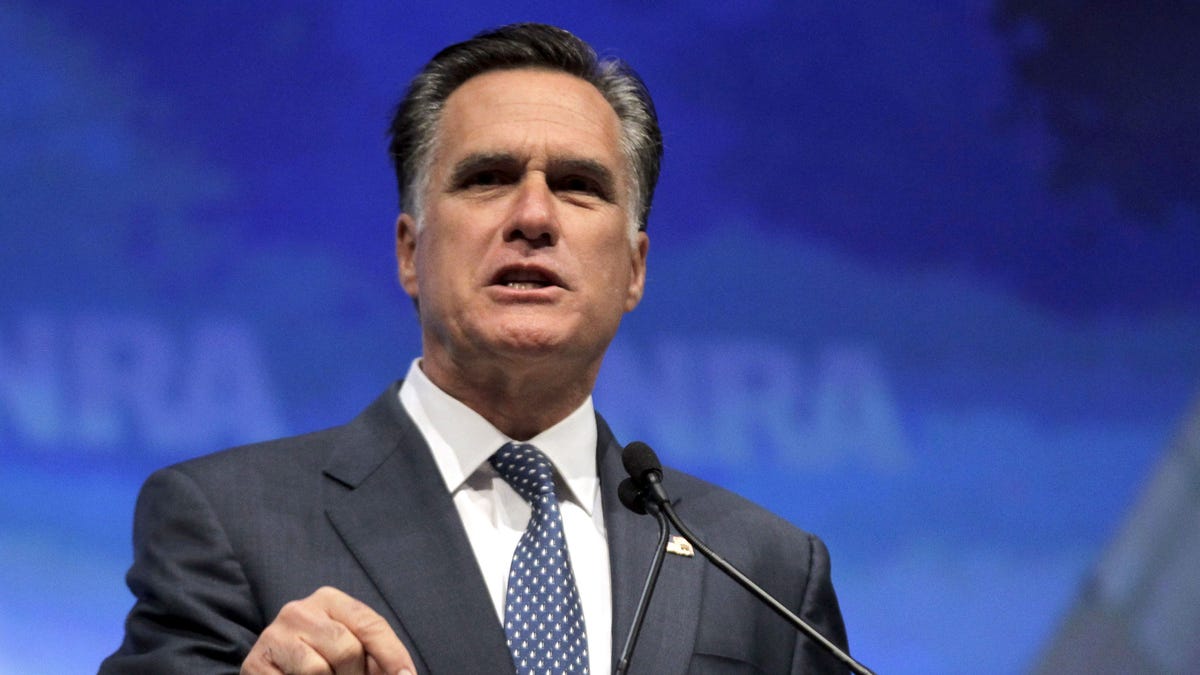
FILE: April 13, 2012: Mitt Romney speaks at the National Rifle Association convention in St. Louis. (AP)
Gun-rights groups perceive President Barack Obama as a threat to unfettered access to firearms. They once had qualms about Mitt Romney, too.
But times and circumstances have changed for Romney, the GOP presidential nominee now in tune with the National Rifle Association and similar organizations, whose members are motivated voters.
In the tight White House race, every bit of support helps, especially in the most closely contested states and particularly from groups that claim millions of members nationwide.
Romney's prior embrace of weapon-control proposals had put him crossways with the NRA and others. These days, Romney is on their good side by opposing renewal of a federal ban on semiautomatic weapons, additional regulations on gun shows and suggested federal gun registration requirements.
The NRA and some less prominent organizations are spending big money on mailings, radio ads, TV commercials and booths at game fairs to promote the former Massachusetts governor and portray Obama as hostile to gun rights.
Gun groups are an important part of an outdoor enthusiast network that neither side is willing to concede.
There are "Sportsmen for Romney" and "Sportsmen for Obama," all playing to the largely male hook-and-bullet crowd that is protective of recreational passions. Neither candidate is considered an avid outdoorsman, though each has made mention of fishing rods or been photographed casting a line.
Romney and his allies underscore his hands-off stance when it comes to guns, and say he would move to open more public land to hunting. They also promote the bona fides of running mate Paul Ryan, who has a permit for just about every season in Wisconsin, his home state.
Last month, Ryan reminded a gathering of sportsmen in Ohio of the hours he has logged in duck blinds, deer stands, pheasant fields and fishing boats. Then came his critique of Obama: "I wonder, I shudder as a gun owner, seeing his record when he was in the Illinois state Senate, what would he do if he never has to face the voters ever again?"
It's the type of message that resonates with voters such as Stan Glover of Bowerston, Ohio. Glover said Romney's past stands gave him pause, but he's more nervous about Obama.
"The uncertainty of politics in Washington, as regards hunters/gun owner rights, has caused undue fear amongst folks that enjoy the shooting sports," said Glover, a manufacturing plant sales director who plans to vote for Romney.
The Obama campaign emphasizes steps by his administration to promote habitat conservation, set aside land and preserve access to land used for recreation. Supporters point to Obama's "American Great Outdoors Initiative" to coordinate conservation and natural resource efforts in all 50 states, whether it's restoring wetlands in Iowa's duck-rich Prairie Pothole Region or filtering phosphorous harmful to fish and fowl in Grand Lake St. Marys in Ohio.
For Obama, minimizing Romney's apparent advantage among voters who place a premium on outdoors issues is the name of the game.
In Iowa and other states, that task falls to people such as Dick Dearden. He's a Democratic state senator and leader of a group of pro-Obama outdoors enthusiasts working to combat negative portrayals of the incumbent among the shotgun crowd.
"The president is not a threat to people who hunt and fish. He's an asset," Dearden said. "I'm a member of the NRA and they are beginning to more and more embarrass me. I'm a Second Amendment person, but I have not seen anything this president has done for the last four years that has hurt anyone's Second Amendment rights."
Obama's campaign highlights a law he signed in his first year as president that allows people with weapons permits to bring loaded guns into national parks and wildlife refuges. The change drew rebukes from gun-control advocates.
But groups working to defeat Obama sound alarms about his support of reinstating an assault weapons ban if one made it through Congress. They also are stoking fears that the president would use a second term to appoint federal judges with restrictive views toward gun ownership. The Supreme Court has been closely divided in recent gun cases, and the balance could shift if Obama had the chance to pick any new justices.
Romney told the leader of the NRA's lobbying arm in a question-and-answer piece published last month that he would appoint "wise, experienced and restrained judges" and fill his Cabinet with "people who agree that the Second Amendment guarantees a fundamental, individual right."
His own views have evolved from when he ran for the Senate and was governor in Massachusetts. In his failed 1994 Senate campaign he backed a waiting period on gun sales and an assault weapons ban that he said were "not going to make me the hero of the NRA." As governor, he signed a state-level assault weapons ban that he argued was part of a brokered deal between the sides in the gun debate.
In the NRA interview published in September, Romney unequivocally opposed new gun restrictions, including one on semiautomatic weapons. "I do not support any additional laws to restrict the right to keep and bear arms," he said. The group endorsed him in Virginia in early October and has since reserved more than $1.3 million in TV ad time in in Florida, Ohio, Virginia and Wisconsin.
Larry Pratt, executive director of Gun Owners of America, acknowledged some hesitancy about Romney but said gun-rights activists were mollified by his selection of Ryan as a running mate.
"It created a lot more willingness to pull his lever, and at least some enthusiasm," Pratt said. "Ryan is at least one of us."




